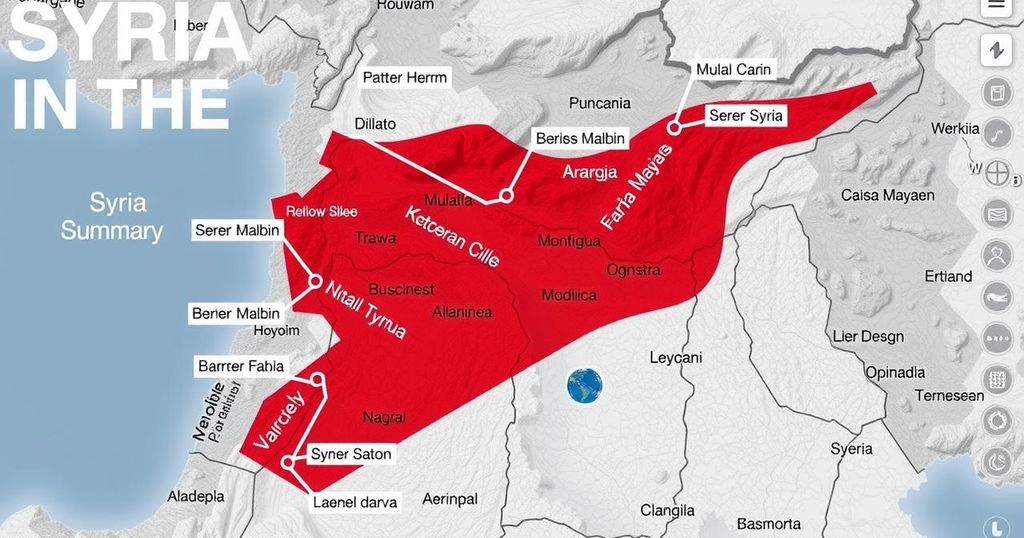World news
ALEPPO, ASIA, ASSAD, BASHA, BASHAR AL - ASSAD, BASHAR AL ASSAD, CIVIL WAR, CIVILIAN CASUALTIES, CONFLICT, DAMASCUS, DARAA, EUROPE/ASIA, FREE SYRIAN ARMY, HA, HAYAT TAHRIR AL SHAM, HOMS, HTS, IRAN, ISIS, MIDDLE EAST, QUNEITRA, REFUGEE CRISIS, RUSSIA, SAYDNAYA, SUWAYDA, SYRIA, SYRIAN ARMY, US, WAR
Sofia Rodriguez
0 Comments
Syria’s Civil War Reaches a New Turning Point as Rebels Capture Damascus
A surprising shift occurred in Syria as rebel forces, led by HTS, captured Damascus and declared freedom from the Assad regime. After years of relative stability, this marked a dramatic escalation in the ongoing civil war. Prime Minister Jalali indicated willingness to hand over power, while reports circulated regarding Assad’s potential flight from the nation. Celebrations ensued in the streets as symbols of Assad’s rule were dismantled, suggesting a significant change in the political landscape of Syria.
On Sunday, a significant development unfolded in the Syrian Civil War, which has persisted since 2011. Hayat Tahrir Al Sham (HTS) declared the nation free from the Bashar Al Assad regime, leading to a surprise takeover of Damascus by rebel forces. The civil conflict, rooted in a wave of uprisings during the Arab Spring, was initially characterized by the vulnerability of Assad’s government until it received substantial military backing from Russia and Iran, which helped stabilize his grip on power.
In recent years, however, relative calm had returned as the Syrian Army successfully contained the insurgencies. The recent drive began when HTS and the Free Syrian Army successfully captured Aleppo, marking their first noteworthy victory in an extended period. Following this momentum, rebel troops advanced towards the capital, overtaking several cities including Daraa, Quneitra, Suwayda, and Homs within a mere 24-hour span. The absence of effective response from Assad’s forces was attributed to their overstretch due to conflicts elsewhere, causing the army’s defensive line to collapse with alarming rapidity.
The rebels promptly seized control of Saydnaya prison, liberating numerous political prisoners from the Assad regime. By Sunday afternoon, the fighters entered Damascus and swiftly dismantled Assad’s decades-long rule. Following the upheaval, Prime Minister Mohammad Jalali expressed readiness to work with the opposition to facilitate a transition of power, urging citizens to protect public property. Reports emerged indicating that President Assad may have fled the country just before the rebels reached the city, with speculation circulating about the fate of his flight. Some accounts claimed his plane was shot down over Jordan, but such reports remain unverified.
In a powerful declaration, HTS proclaimed the liberation of Syria and called upon fighters to safeguard public buildings in preparation for a formal handover of governance to the interim leadership. The streets of Damascus witnessed scenes of celebration as citizens rallied against symbols of the Assad regime, even toppling statues of both Bashar and Hafez Al Assad. This pivotal moment signifies a dramatic shift in the Syrian Civil War and carries substantial implications for the region’s political landscape.
The Syrian Civil War began in 2011 as an outcome of the broader Arab Spring, during which numerous authoritarian regimes in the Arab world were challenged. Initially, the conflict saw growing momentum against President Bashar Al Assad, who faced widespread protests. However, the situation was drastically altered when significant military support was provided by allies such as Russia and Iran, stabilizing Assad’s regime. Over time, rebel forces had continued their clashes with government troops, with various factions vying for control amidst a fragmented opposition.
The recent developments in Syria, marked by the surprising declaration of liberation by HTS and the fall of Damascus, illustrate a critical turning point in enduring conflict. With Prime Minister Jalali’s overtures toward cooperation with opposition factions, the prospect of a power transition emerges amid significant uncertainty surrounding the fate of Assad. This rapidly evolving situation underscores the intricate and volatile nature of political power in Syria, with regional and international implications yet to be fully understood.
Original Source: www.hindustantimes.com




Post Comment